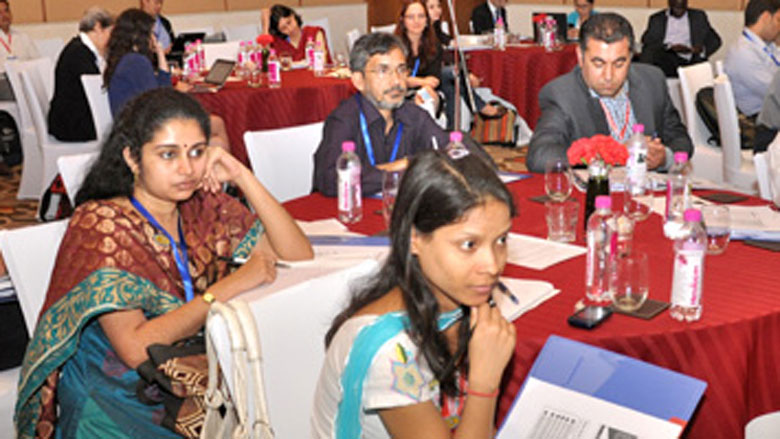The South Asia Regional Impact Evaluation and Survey Methods Workshop, hosted jointly with the National Council of Applied Economic Research (NCAER), brought together regional policymakers, researchers and development field staff to hone their skills in impact evaluation and survey methods. The workshop was designed to improve participants' understanding of and ability to use impact evaluations and survey methods to craft more effective development policies and programs. The workshop was led by the Strategic Impact Evaluation Fund (SIEF), which is funded with the generous support of the British Government'sDepartment for International Development (DFID).
The purpose of the workshop was to build knowledge on the use of impact evaluation among policymakers and program managers and allow operational teams to apply this knowledge to the design and implementation of program-specific impact evaluations. With the Impact Evaluation in Practice handbook as a guide, the workshop combined intensive training in impact evaluation methods with hands-on clinics to fully integrate impact evaluations into projects related to human development issues. Throughout the first week, project teams worked in small groups facilitated by World Bank moderators and impact evaluation specialists from JPAL. This approach allowed the provision of tailored support and the direct application of tools and global knowledge to project and region-specific contexts. The second week of the workshop focused on survey design and data collection for impact evaluation.
Beyond the design of impact evaluations, the workshop contributed to strengthening the development effectiveness of human development and water and sanitation projects. Teams were challenged to clarify the results chains linking their interventions to final outcomes, as well as to develop impact evaluation designs with specific output and outcome indicators throughout the results chain. This process enhances the focus on results and ensures that actions and activities are aligned with project development objectives. It also ensures that success is appropriately measured, building a community of practice and appreciation for evidence-based decision-making in the region.
"As the Technical Advisor of Policy and Planning to the Ministry of Public Health, the knowledge and experience I have gained here will enable me to promote the impact evaluation program in my country where it is needed the most."
– Sher Shah Amin, Technical Advisor, Ministry of Public Health, Afghanistan
The workshop attracted 95 participants from more than 10 countries, among them: Afghanistan, Bangladesh, Canada, Ethiopia, India, Nepal, Pakistan, Papua New Guinea, Tajikistan, United Kingdom and Vietnam. During the workshop, participants developed or honed impact evaluations in the fields of education, health, social protection, and water and sanitation. |
The workshop provided a platform for effective South-South exchange. Project teams had the opportunity to interact with other teams working on similar operations in the region, helping the participants exchange experiences in designing and implementing impact evaluations for large-scale development programs. The final day of the first week of the workshop consisted of presentations of evaluation designs by project teams, followed by feedback from other workshop participants. The workshop also served as an opportunity to strengthen links with a range of partner institutions, creating a strong network for knowledge sharing and professional growth. Partner institutions including NCAER, DfID, Clinton Health Access Initiative (CHAI), 3ie, Pratham, Indian Council for Research on International Economic Relations (ICRIER), and Save the Children participated either as stand-alone teams or as part of World Bank project teams.
Participants rated the course highly. On the final workshop evaluation, 94% of the respondents rated the workshop a 4 or 5 (on a 5 point scale) for overall quality. Workshop faculty received notably high scores for "quality of the content presented" and "knowledge of the material."
Securing funding is critical for successful delivery of quality impact evaluations. The proposals developed during the workshop will seek to leverage trust fund resources in order to ensure the continuity of the work. Several participants have already applied for funding during the previous SIEF call for proposals, while others are planning to apply for the next call in the summer.
